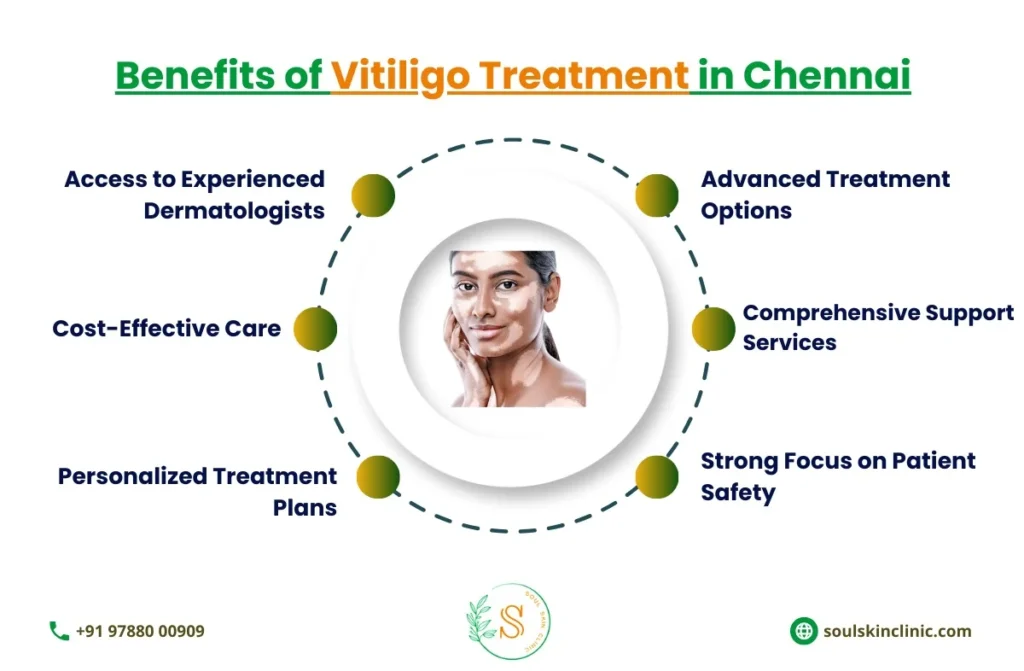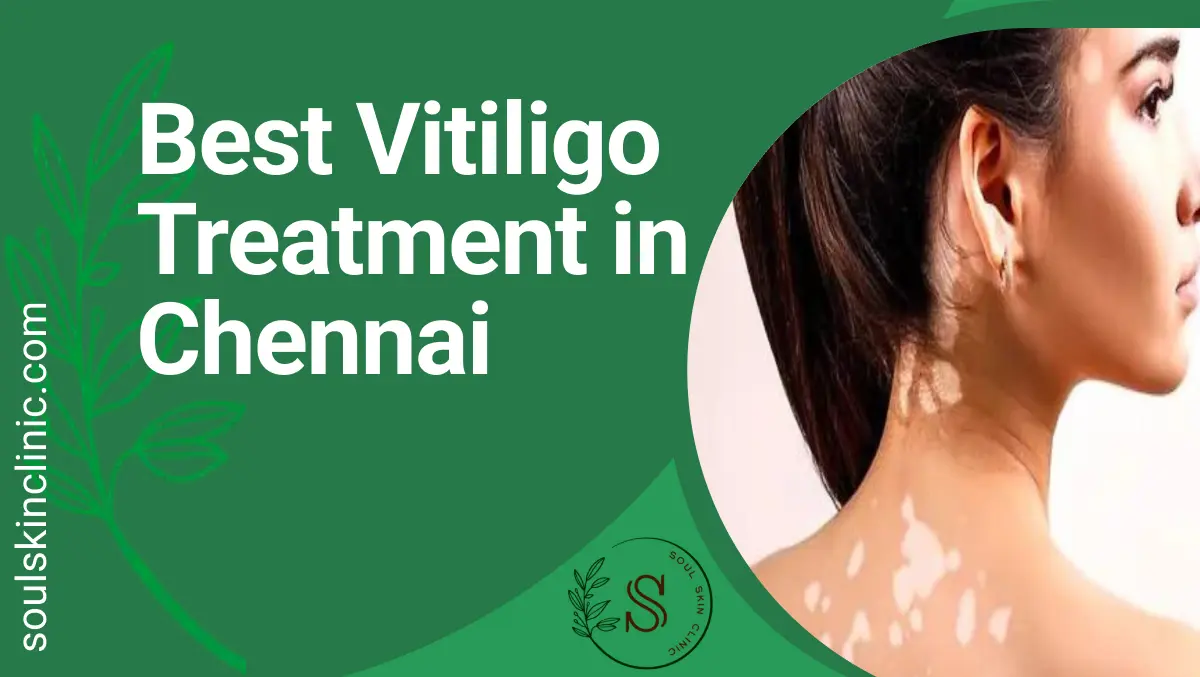Vitiligo is a long-term skin condition marked by the absence of melanocytes, the cells responsible for producing melanin, the pigment that imparts color to the skin. As a result, the affected areas develop white patches. While getting the best vitiligo treatment in Chennai is not harmful or contagious, it can significantly impact a person’s self-esteem and quality of life.
Who Can Take the Treatment?
Vitiligo treatment options are available for individuals of all ages and skin types. Whether the condition is stable or progressive, treatment may be pursued. However, certain factors such as age, overall health, the extent of depigmentation, and individual preferences can influence the choice of getting the best vitiligo treatment in Chennai.
When to Approach for Treatment?
It is essential to approach the vitiligo specialist in Chennai for seeking medical advice if you notice any depigmented patches on your skin. While vitiligo can affect individuals of all ages and races, it often starts before the age of 30.
Early detection and intervention are crucial as the chances of repigmentation are higher when the condition is in its early stages. Moreover, a dermatologist can confirm the diagnosis and rule out any other skin disorders that may mimic vitiligo.

Diagnostic Tests
To diagnose vitiligo, a vitiligo specialist in Chennai will typically perform a physical examination of the affected skin and inquire about the patient’s medical history. In some cases, a Wood’s lamp examination may be used to highlight depigmented areas, which can aid in confirming the diagnosis. In rare cases, a skin biopsy may be necessary to rule out other skin disorders or autoimmune conditions.
Treatment Procedures
There are several treatment options available for the best vitiligo treatment in Chennai, and the choice of therapy depends on factors such as the extent of depigmentation, the location of patches, and the patient’s age and overall health. Here are some of the commonly used treatment procedures:
- Topical Corticosteroids: These are commonly prescribed for localized vitiligo. They work by suppressing the immune response that targets melanocytes. Regular application over several months may lead to repigmentation.
- Topical Calcineurin Inhibitors: These drugs help to modulate the immune response in the skin and can be used on sensitive areas where corticosteroids may not be suitable.
- Phototherapy: This vitiligo treatment in Chennai involves exposing the affected skin to ultraviolet (UV) light, either in the form of narrowband UVB or PUVA (Psoralen and UVA). Phototherapy stimulates melanocyte activity and can lead to repigmentation over time.
- Excimer Laser: This targeted laser therapy delivers UVB light to depigmented patches, helping to stimulate melanocyte production. This best vitiligo treatment in Chennai is particularly useful for small, localized areas.
- Depigmentation: In cases of widespread vitiligo where repigmentation is not feasible, some individuals may opt for depigmentation of the remaining normal skin to achieve a uniform appearance.
- Surgical Interventions: For stable vitiligo that doesn’t respond to other treatments, surgical procedures like autologous melanocyte transplantation, punch grafting, and tattooing may be considered.
- Oral Medications: In certain cases, oral medications like oral corticosteroids or immunomodulators may be prescribed to modulate the immune response.
Symptoms Of Vitiligo
- Depigmentation: Loss of skin color, resulting in white patches.
- Patchy Skin: Irregularly shaped patches on various parts of the body.
- Symmetrical Patterns: Often appears in symmetrical patterns on both sides of the body.
- Hair Color Loss: White or prematurely gray hair on the affected skin.
- Sensitivity to Sunlight: Increased sensitivity to sunlight on depigmented areas.
- Changes in Eye Color: Loss of pigment in the iris or retina, affecting eye color.
- Emotional Impact: Potential psychological effects due to changes in appearance.
Types Of Vitiligo
- Non-segmental Vitiligo: The most common type, characterized by symmetrical depigmentation patches on both sides of the body.
- Segmental Vitiligo: Depigmentation occurs in a limited area, often on one side of the body, and progresses over time.
- Universal Vitiligo: Rare and severe, causing widespread depigmentation across the entire body.
- Focal Vitiligo: Small, isolated patches of depigmentation.
- Mucosal Vitiligo: Involves depigmentation of mucous membranes, such as inside the mouth or nose.
Benefits of Best Vitiligo Treatment in Chennai
The best vitiligo treatment in Chennai offers the potential for repigmentation, which can significantly improve the affected individuals’ self-esteem and quality of life. Successful treatment can reduce emotional distress and psychological challenges associated with the condition, leading to enhanced social and professional engagement.
It may also provide some natural sun protection and allow for a wider range of clothing choices, boosting confidence and well-being.
Risks of Vitiligo Treatment
The vitiligo treatment in Chennai may not always lead to satisfactory results, and the degree of repigmentation achieved can vary. Some treatments can cause side effects, such as skin irritation and sun sensitivity. Recurrence of vitiligo is possible even after successful repigmentation.
Additionally, treatment provided by the vitiligo specialist in Chennai can be time-consuming, expensive, and emotionally challenging if expectations are not met. Surgical interventions carry inherent surgical risks like infection and scarring.
Symptoms Of Vitiligo
Vitiligo is a skin condition characterized by the loss of pigment, resulting in white patches on the skin. While the primary symptom of vitiligo is depigmented patches, there are other signs and symptoms associated with the condition:
- Depigmented Patches: The most common symptom of vitiligo is the appearance of white patches on the skin. These patches may vary in size and shape and can occur anywhere on the body.
- Premature Greying of Hair: In addition to skin depigmentation, vitiligo can also cause premature greying or whitening of hair on the scalp, eyebrows, eyelashes, and other body parts.
- Symmetrical Patterns: Vitiligo patches often appear in symmetrical patterns, meaning they occur on both sides of the body in corresponding locations.
- Sensitivity to Sunlight: People with vitiligo may experience increased sensitivity to sunlight, leading to sunburn or irritation in depigmented areas.
- Changes in Color of Mucous Membranes: In some cases, vitiligo can affect the mucous membranes inside the mouth and nose, leading to changes in color and pigmentation.
For effective management of vitiligo, it’s crucial to seek treatment from experts in dermatology. Soul Skin Clinic offers the best vitiligo treatment in Chennai, utilizing advanced therapies to address the condition and restore pigmentation, thus improving skin appearance and boosting confidence.
Conclusion
To conclude, it is essential to remember that not all cases of vitiligo require the best vitiligo treatment in Chennai, and the management approach should be tailored to each individual’s needs. Additionally, the treatment provided by the experts at Soul Skin Clinic can vary from person to person, and patience is often required to see positive results. Supportive therapies and counseling can also play a vital role in helping individuals cope with the emotional challenges associated with vitiligo.
Read also Microneedling in Chennai.

